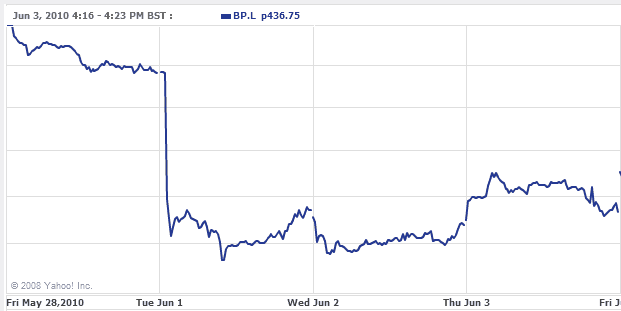
Imagine for a moment your job is CEO of BP and you take a look at the latest share price for your company. This chart doesn’t make you feel too good does it?
Then imagine doing a blog search on Google for your company name and discovering blog posts claiming you have produced a fake Twitter account, that your company shareholders are in deep water and that all across the web people are re-designing your logo to highlight your company’s recent dramatic turn of events.
If you can still stomach it, head over to Facebook and simply search for your brand name. You’ll find dozens of groups with thousands of members all claiming “No BP for me” and several “Boycott BP” pages with more than half a million people as “fans”.
Dare you go to search on Twitter? If you do, you’ll find thousands of tweets all saying your brand sucks.
So, you might head off to read some “traditional” news for a more balanced and sobering judgement on your company – only to find that they too are saying your company’s brand is shot to pieces.
What is going on, you might think. True, we’ve had a mishap in the ocean, but we’re doing our best under difficult circumstances; come on, give us a break. You might then get your branding team, your PR people and your marketing gurus to fix the damage. But rather like a gushing geyser of oil on the ocean floor, the bad publicity keeps on pouring out on blogs, Facebook, Twiter, YouTube – you name it.
But you would not be surprised at all about this seemingly unpluggable barrage of bad publicity if you had been at Ascot Race Course this morning where you could have listened to Richard Robinson from Google speaking at a Business Insight event. He said: “It is no longer the case that you can control your brand; the users will do that for you.” In other words, the interactive, open nature of the Internet means you cannot be in charge of the brand your company wishes to project.
Does that mean that Tony Hayward, the CEO of BP should simply cave in and give up? Does it mean that any company should simply accept that the power is now in the hands of the consumer, rather than in yours? What was interesting in Richard Robinson’s presentation was that in many Berkshire-based businesses that seems to be the case.
For instance, when he asked how many people used the Google Wonder Wheel, only two people out of more than 170 put up their hands (see video below for an explanation of Wonder Wheel). Similarly, when the audience was asked if they used Google Alerts, less than 20 people put up their hands. And there were only 30 or so hands that went up for companies that use YouTube in their business.
In other words, there is a plethora of free online tools – many available for years – which can help companies counter the impact of the consumer-led web. Yet, most companies appear to be ignoring the very tools which can help them overcome the negativity of blogs, Facebook groups, Tweets or other damaging items online. So why is that?
The man from Google, Richard Robinson, revealed the answer in his opening comments. He said that the Internet has moved on from a state where “just being online was enough”. Now, the Internet is an interactive, involved, user-led world where companies simply have to match the requirements of these users to what they supply and do. No longer can you simply have a website; you have to “live” online. Few companies – including BP – “get” that. Indeed, by the show of hands to the various questions in this morning’s seminar it was clear that most businesses in the area were still thinking in the “old Internet” ways.
If you haven’t changed – and you have yet to focus you entire business activity around the user-led Internet – there is a strong chance that those very users will bite you where it hurts and your business income will look very much like that BP share price chart. Ouch..! Getting the best out of the Internet in the coming years is not about technology, or about design; it is, instead, about the attitude of mind of business owners. According to today’s evidence, a massive change in thinking is needed by many businesses. They still appear to be where Richard Robinson said they should not be – thinking that simply being online is enough. It isn’t – and actually hasn’t been for around five years now.
